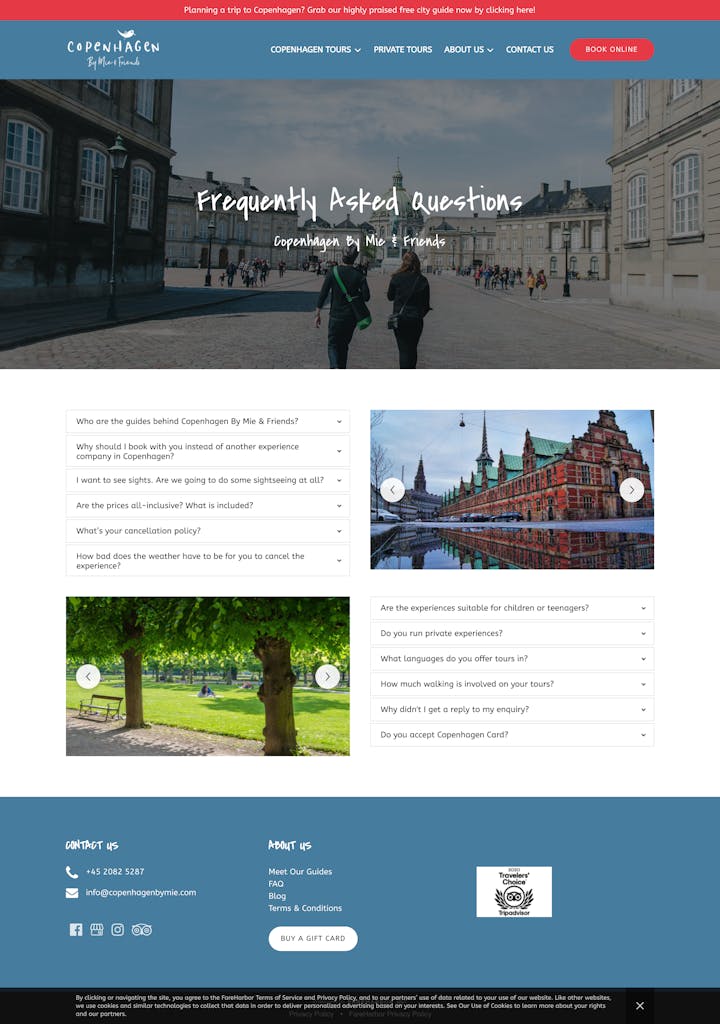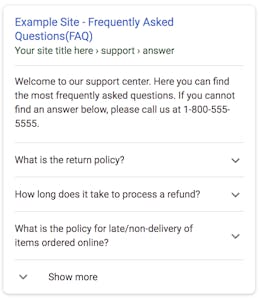- 11 minute read
- Business Management Tips
- Websites
Tell Your Story & Connect With Customers With Your Website’s ‘About Us’ Page
All Skill Levels
Get a behind-the-scenes-look into FareHarbor's 2024 season

One of the top benefits of writing detailed tour/activity descriptions is that it reduces the number of people calling with questions about the experience, freeing up more time for you to manage other aspects of your business. But if you’re really hoping to save time and preempt customer concerns, you should write a detailed FAQ (frequently asked questions) page. FAQ pages:
The key to creating an effective FAQ page lies in answering the questions your potential customers might have through concise content that is framed in the way customers typically ask the questions. From writing in the language of your users to checking your reviews for common questions from guests, this guide is full of best practices and tips for writing an effective FAQ page.
Quality FAQ pages help potential customers help themselves without delaying their booking process. If, for example, a person is about to book a food tour but doesn’t see any information about vegan or vegetarian options, she would have to contact the business for more information. If the website had an FAQ page with a section about dietary restrictions, this customer would be one step closer to completing her booking.
FAQ pages save time that you might have spent answering the phone or responding to questions via email. Additionally, your website looks much more professional and trustworthy with answers to common questions in a location that’s easy to find.
Finally, FAQ pages drive traffic, especially when you answer common questions about your industry, such as, “what should I wear on a hiking tour?” When you put content like this in Q&A format and add FAQ structured data (more on this later), you have the potential to bring additional website traffic and new customers to your business. And if you answer questions concisely and completely, your text could be included in one of Google’s answer boxes or featured snippets, giving you a traffic boost.

You can probably think of dozens of questions your customers might ask about your tours and activities, but the best FAQ pages are concise and only answer essential questions. This is not the place to answer questions such as “what can I expect on the sightseeing tour?” Questions about tour itineraries, duration, and start time should be answered in the tour description to avoid overwhelming the FAQ page and to put the information exactly where guests expect to find it.
Your FAQ page is the place for questions about preparing for the experience, booking online, parking at or near your location, private tour availability, gratuities, and other questions of a similar nature. Some examples include:
Of course, the specific questions will depend entirely on how your business operates, and you can get a better idea of what to include in your FAQ by thinking about the questions you usually get from guests before or during the experience. To get started, curate a list of common questions from:
For more FAQ ideas, use Google’s Auto Suggest feature. Start typing a question about your business into the search bar, and you’ll see the commonly asked questions other people search for. You can also check out the Q&A feature on your Google My Business, where people can ask and answer questions about your business. Also consider checking out your competitors’ websites to see if they’ve answered any questions you hadn’t thought to include.
Always frame the question using “I” and writing in the first person to match how your readers would actually ask a question (e.g. “Can I pay with cash?”). This shows that you’re placing the focus on the customer’s needs.
Write the answers in your readers’ language so that they are as clear and relevant as possible. Avoid jargon, and be sure to fully explain any industry-specific information that your average guest might not understand.
 Pro tip: Don’t be afraid to inject some personality into your answers if it fits with your brand. Show customers that you’re thinking about them by answering their questions personally.
Pro tip: Don’t be afraid to inject some personality into your answers if it fits with your brand. Show customers that you’re thinking about them by answering their questions personally.
They’re called frequently asked questions for a reason! When users click through to your FAQ page, they expect to see questions and answers, not statements. Questions should begin with question words (what, how, can, etc.) to stay true to the FAQ format. Avoid using statements or labels like “pet policy” or “parking information.”
Answer the questions as concisely as possible while providing all of the important information. Remember, your customers are looking for quick answers to their questions, so there’s no need to write an essay.
 Pro tip: Start your answers to yes/no questions with a simple “yes” or “no” before providing context. This way someone can easily see the ultimate answer to their question at a glance. You can certainly go into more detail after that, but don’t make people dig for the information they’re looking for!
Pro tip: Start your answers to yes/no questions with a simple “yes” or “no” before providing context. This way someone can easily see the ultimate answer to their question at a glance. You can certainly go into more detail after that, but don’t make people dig for the information they’re looking for!
If you’re worried about including too many questions on your FAQ page, think of ways to organize the page to break up the information. Merge questions of a similar nature when it makes sense to do so and make the page easy to navigate with a table of contents, on-page anchored links, bulleted information, etc. to make the content easier to digest. Don’t worry too much about the number of questions, as long as each one is completely necessary.
Most guests are well aware of what an FAQ page is and will search for it by that name, so make sure to put “FAQ” in the title of the page and in the menu label. There’s no need to complicate it with a title like “More Info About Our Tours.”
 Pro tip: Link the FAQ page in your main navigation and website footer so it’s easy to find. Think of your website footer as a place to include important information you want people to be able to locate regardless of the page they are on. The footer should include social media accounts, your phone number, FAQ page, and book buttons or links.
Pro tip: Link the FAQ page in your main navigation and website footer so it’s easy to find. Think of your website footer as a place to include important information you want people to be able to locate regardless of the page they are on. The footer should include social media accounts, your phone number, FAQ page, and book buttons or links.
 Structured data helps Google understand the content of a page and its purpose. It is coded using on-page schema markup. By properly marking up your FAQ page, you give it a chance to get a rich result in Google Search. Rich results highlight important information right in the SERP, such as review ratings and answers in FAQ format. Schema markup can also help you get a featured snippet, a SERP feature that answers the query directly and is featured above organic results.
Structured data helps Google understand the content of a page and its purpose. It is coded using on-page schema markup. By properly marking up your FAQ page, you give it a chance to get a rich result in Google Search. Rich results highlight important information right in the SERP, such as review ratings and answers in FAQ format. Schema markup can also help you get a featured snippet, a SERP feature that answers the query directly and is featured above organic results.
Learn how to add FAQ structured data to your website. If you’re on a FareHarbor site, we’ve taken care of this for you.
Whether you’re writing an FAQ page for the first time or are planning to update your current content, follow the tips in this guide to identify the important questions your guests want to see answered. Don’t forget to update your FAQ page any time your policies change or if you think of a new question to include. It’s essential that the page reflects the most up-to-date information about your business. For more tips on making the most of your website, visit our website guides.